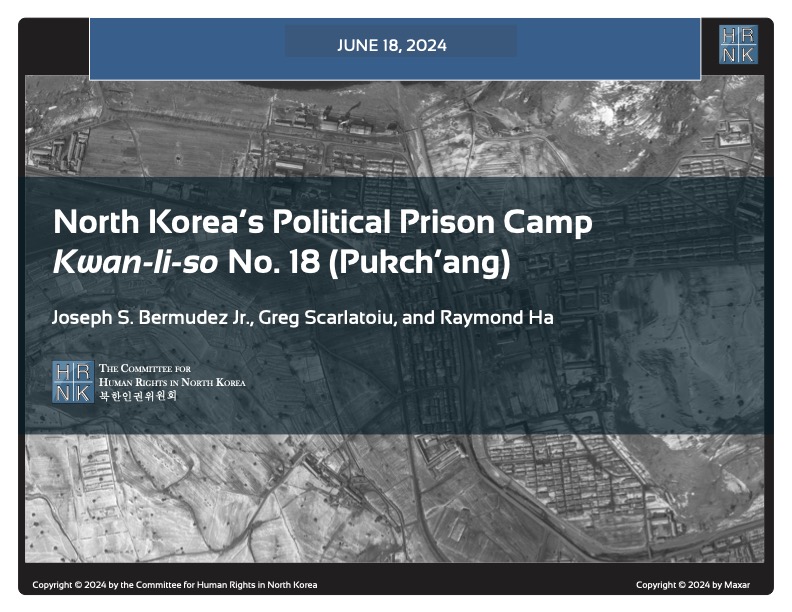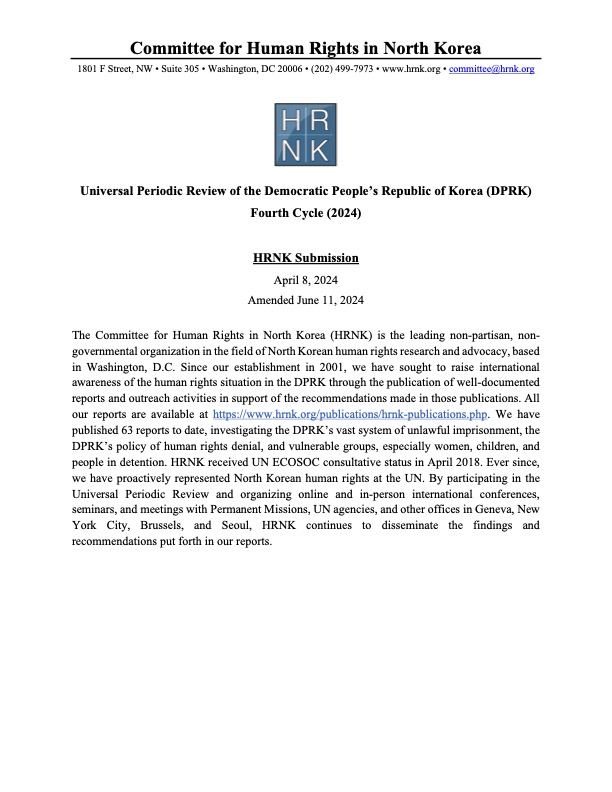PRESS RELEASE
Report Embargoed until 12:01 am EDT, Monday, April 27, 2015
Committee for Human Rights in North Korea Releases New Report: Arsenal of Terror— North Korea, State Sponsor of Terrorism
North Korea’s sponsorship of terrorism is a threat to human rights in several regions of the world today, including the United States, reveals a new report by the Committee for Human Rights in North Korea (HRNK). HRNK will launch the 100-page report, Arsenal of Terror—North Korea, State Sponsor of Terrorism on April 27 at the National Press Club in Washington, D.C.
Authored by attorney and North Korea expert Joshua Stanton, Arsenal of Terror examines the legal standards for listing a state as a sponsor of terrorism (SSOT), the legal effects of a SSOT listing, and the evidence that North Korea’s recent conduct meets that standard.
“Arsenal of Terror presents a careful examination of the law and politics surrounding designation as a state sponsor of terror together with a comprehensive review of North Korean activities in reference to the law. This invaluable and unprecedented report has set the gold standard and will be the standard reference on this issue for years to come,” says Marcus Noland, HRNK Board member and executive vice president and director of studies, Peterson Institute for International Economics (PIIE).
The report determines that the applicable standards are vague and inconsistent, that U.S. State Department reporting on terrorism has not always conformed to these standards, and that some of the consequences of North Korea’s SSOT re-listing would be legally and financially substantial. Arsenal of Terror further reveals that evidence of North Korea’s recent sponsorship of terrorism is both extensive and consistent with the applicable legal standards and precedents cited to justify previous SSOT listings.
According to Nicholas Eberstadt, HRNK Board member and Henry Wendt Scholar in Political Economy, American Enterprise Institute (AEI), "Joshua Stanton's careful and meticulously documented study provides broad and compelling evidence that the DPRK continues to operate as a state sponsor of international terror. The facts he marshals are deeply disturbing—and also diplomatically inconvenient for those who wish for Washington to continue its "de-listing" of North Korea as a designated and sanctioned State Sponsor of Terror.”
“Stanton's study will surely invite further discussion of how the U.S. government and the international community should respond to Pyongyang's violations—and it will also most admirably help clarify thinking about the sorts of abhorrent actions that should be regarded as "terrorism" by civilized nations," says Eberstadt.
North Korea was removed from the SSOT list in 2008. The report examines North Korean assassinations and kidnappings, both attempted and executed as well as plots to commit such acts, before and after 2008. The report further scrutinizes other conduct that could justify North Korea’s SSOT re-listing, including threats against civilian targets and terrorist financing.
“Since 2008, North Korea has increased its use of terrorism as an instrument of state policy, and also appears to have increased its material support for designated terrorist organizations,” says HRNK Executive Director Greg Scarlatoiu. He further adds: “North Korea’s recent conduct poses a particular threat to human rights activists and dissidents in exile. It has also repeatedly threatened the civilian population of South Korea and other nations, including the United States. The re-listing of North Korea as a state sponsor of terrorism could lead specifically to court cases supportive of victims.”
The report goes beyond just an investigation of North Korea, to call on the United States to clarify the legal standards for SSOT listing as well as the definition of “international terrorism” and “support of terrorism.” Arsenal of Terror further recommends that the United States report and consider all acts that meet the applicable legal standards, and create an alternative authority to sanction threats to international peace that do not qualify as sponsorship of terrorism. The report proposes that the United States reconsider the sufficiency of existing SSOT sanctions.
The Committee for Human Rights in North Korea, established in 2001 by a distinguished group of foreign policy and human rights specialists, seeks to draw attention to human rights conditions in North Korea by publishing well-documented reports and papers, convening conferences, testifying at national and international fora, and seeking creative ways to bring freedom and human rights to the North Korean people.
The report Arsenal of Terror—North Korea, State Sponsor of Terrorism, embargoed until 12:01 am EDT Monday, April 27 is available on HRNK’s website: www.hrnk.org.
Contact: Joshua Stanton, author: [email protected]
Greg Scarlatoiu, executive director, HRNK: [email protected]; 202-499-7970
This is the first satellite imagery report by HRNK on a long-term political prison commonly identified by researchers and former detainees as Kwan-li-so No. 18 (Pukch'ang).
This report was concurrently published on Tearline at https://www.tearline.mil/public_page/prison-camp-18.
To understand the challenges faced by the personnel who are involved in North Korea’s nuclear program, it is crucial to understand the recruitment, education, and training processes through the lens of human rights. This report offers a starting point toward that understanding.
North Korea’s scientists and engineers are forced to work on the nuclear weapons program regardless of their own interests, preferences, or aspirations. These individuals may be described as “moder
In this submission, HRNK focuses its attention on the following issues in the DPRK:
- The status of the system of detention facilities, where a multitude of human rights violations are ongoing.
- The post-COVID human security and human rights status of North Korean women, with particular attention to sexual and gender-based violence (SGBV).
- The issue of Japanese abductees and South Korean prisoners of war (POWs), abductees, and unjust detainees.
This report provides an abbreviated update to our previous reports on a long-term political prison commonly identified by former prisoners and researchers as Kwan-li-so No. 25 by providing details of activity observed during 2021–2023.
This report was originally published on Tearline at https://www.tearline.mil/public_page/prison-camp-25.
This report explains how the Kim regime organizes and implements its policy of human rights denial using the Propaganda and Agitation Department (PAD) to preserve and strengthen its monolithic system of control. The report also provides detailed background on the history of the PAD, as well as a human terrain map that details present and past PAD leadership.

HRNK's latest satellite imagery report analyzes a 5.2 km-long switchback road, visible in commercial satellite imagery, that runs from Testing Tunnel No. 1 at North Korea's Punggye-ri nuclear test facility to the perimeter of Kwan-li-so (political prison camp) no. 16.
This report proposes a long-term, multilateral legal strategy, using existing United Nations resolutions and conventions, and U.S. statutes that are either codified or proposed in appended model legislation, to find, freeze, forfeit, and deposit the proceeds of the North Korean government's kleptocracy into international escrow. These funds would be available for limited, case-by-case disbursements to provide food and medical care for poor North Koreans, and--contingent upon Pyongyang's progress
For thirty years, U.S. North Korea policy have sacrificed human rights for the sake of addressing nuclear weapons. Both the North Korean nuclear and missile programs have thrived. Sidelining human rights to appease the North Korean regime is not the answer, but a fundamental flaw in U.S. policy.
(Published by the National Institute for Public Policy)

North Korea’s forced labor enterprise and its state sponsorship of human trafficking certainly continued until the onset of the COVID pandemic. HRNK has endeavored to determine if North Korean entities responsible for exporting workers to China and Russia continued their activities under COVID as well.
George Hutchinson's The Suryong, the Soldier, and Information in the KPA is the second of three building blocks of a multi-year HRNK project to examine North Korea's information environment. Hutchinson's thoroughly researched and sourced report addresses the circulation of information within the Korean People's Army (KPA). Understanding how KPA soldiers receive their information is needed to prepare information campaigns while taking into account all possible contingenc
This report is part of a comprehensive long-term project undertaken by HRNK to use satellite imagery and former prisoner interviews to shed light on human suffering in North Korea by monitoring activity at political prison facilities throughout the nation. This is the second HRNK satellite imagery report detailing activity observed during 2015 to 2021 at a prison facility commonly identified by former prisoners and researchers as “Kwan-li-so No. 14 Kaech’ŏn” (39.646810, 126.117058) and
This report is part of a comprehensive long-term project undertaken by HRNK to use satellite imagery and former prisoner interviews to shed light on human suffering in North Korea by monitoring activity at civil and political prison facilities throughout the nation. This study details activity observed during 1968–1977 and 2002–2021 at a prison facility commonly identified by former prisoners and researchers as "Kyo-hwa-so No. 3, T'osŏng-ni" and endeavors to e
This report is part of a comprehensive long-term project undertaken by HRNK to use satellite imagery and former detainee interviews to shed light on human suffering in the Democratic People’s Republic of Korea (DPRK, more commonly known as North Korea) by monitoring activity at political prison facilities throughout the nation. This report provides an abbreviated update to our previous reports on a long-term political prison commonly identified by former prisoners and researchers as Kwan-li-so<
Through satellite imagery analysis and witness testimony, HRNK has identified a previously unknown potential kyo-hwa-so long-term prison-labor facility at Sŏnhwa-dong (선화동) P’ihyŏn-gun, P’yŏngan-bukto, North Korea. While this facility appears to be operational and well maintained, further imagery analysis and witness testimony collection will be necessary in order to irrefutably confirm that Sŏnhwa-dong is a kyo-hwa-so.

"North Korea’s Long-term Prison-Labor Facility Kyo-hwa-so No. 8, Sŭngho-ri (승호리) - Update" is the latest report under a long-term project employing satellite imagery analysis and former political prisoner testimony to shed light on human suffering in North Korea's prison camps.

Human Rights in the Democratic Republic of Korea: The Role of the United Nations" is HRNK's 50th report in our 20-year history. This is even more meaningful as David Hawk's "Hidden Gulag" (2003) was the first report published by HRNK. In his latest report, Hawk details efforts by many UN member states and by the UN’s committees, projects and procedures to promote and protect human rights in the DPRK. The report highlights North Korea’s shifts in its approach
South Africa’s Apartheid and North Korea’s Songbun: Parallels in Crimes against Humanity by Robert Collins underlines similarities between two systematically, deliberately, and thoroughly discriminatory repressive systems. This project began with expert testimony Collins submitted as part of a joint investigation and documentation project scrutinizing human rights violations committed at North Korea’s short-term detention facilities, conducted by the Committee for Human Rights












